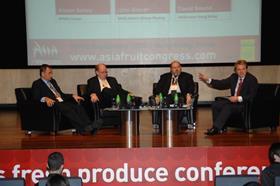
Major changes to the way retailers in Asia source their fresh fruit and vegetables are likely to have a significant impact on suppliers during the next couple of decades as the major supermarket and hypermarket operators look to globalise their procurement programmes and develop more direct links with producers.
This was among the major conclusions reached by three of the Asian retail industry’s leading players during the opening session of the Asiafruit Congress 2008, which began today at the Hong Kong Convention and Exhibition Centre alongside the Asia Fruit Logistica trade exhibition.
John Glover, food director at Metro Group Buying based in Hong Kong, told delegates he expected his company and others like it to look more closely at the possibility of adopting global procurement strategies in the near future as intense competition and demand for regular, high quality volumes continues to intensify and as food safety requirements become ever more exacting.
“Given the large volume of product we source every year, Metro is looking to pull together the group’s international procurement and source as one company,” said Mr Glover. “Given the billions we are going to be investing in future, there is a great concern that we need to look again at the way we buy and source our products. Over the next 10 years, the retail and wholesale sectors are set to double their business, but many countries are already consuming more than can be produced.”
Anson Bailey, business development principal at KPMG China, suggested that Asia in particular was becoming a focal point for sourcing activities. “Companies like Tesco are moving their global sourcing teams to places like Hong Kong,” he revealed.
But as demand from emerging markets in Asia, as well as the Middle East and Russia, continues to grow, increased pressure is likely to be felt by buyers and suppliers alike as requirements pertaining to food safety, corporate social responsibility and consumer shopping habits become more important.
“Sourcing means taking on your suppliers’ own standards and values, so successful retailers have to insist on imposing their right to audit,” added Mr Bailey. “Clauses like this will become commonplace among retailers in Asia and this is something with which suppliers must contend.”
In addition, rising inflation and a worsening global economy are likely to mean a challenging outlook for many of Asia’s fresh produce industry players over the next couple of years at least.
“We’ve seen some turbulent economic conditions of late, but the impact here in Asia has only been marginal,” commented David Bound, fresh food and supply chain director for Wellcome Hong Kong / Dairy Farm Group. “Sales remain buoyant, but there has been in shift in certain fundamentals, such as double digit inflation on food. As retailers, we therefore have to deliver more value, such as increased convenience and food safety, for a lower price, and we need to differentiate that value to the consumer.”



